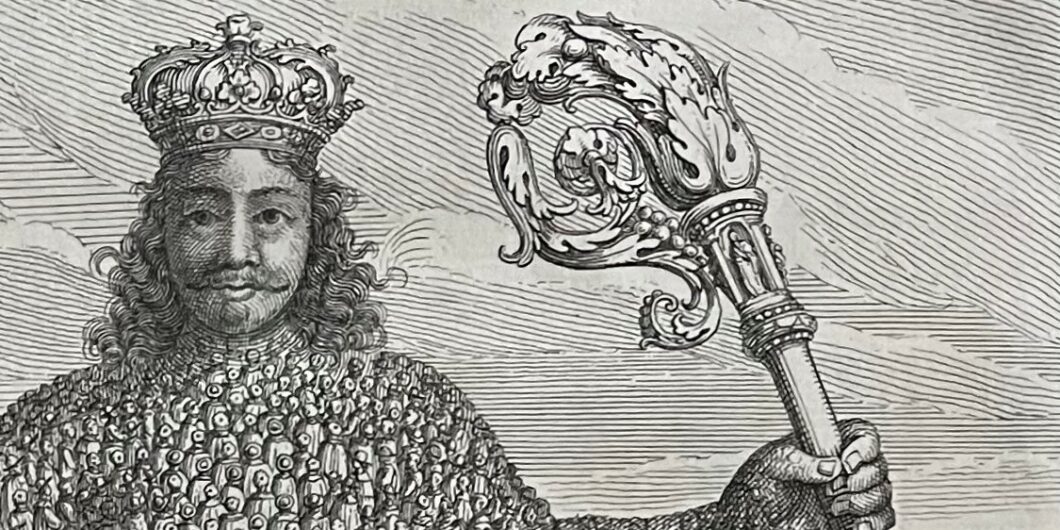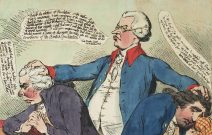The Return of Hobbesian Liberalism?
State Leviathans are back, and this time they are even worse. John Gray holds little hope in his recent book The New Leviathans that a sane liberalism can prevail against the forces of hyper-liberalism in the West. Such hyper-liberalism has mutated from liberal societies and now threatens liberal democracies.
Gray’s book hinges on the insights of Thomas Hobbes, one of the most primary liberal thinkers of the modern period. Hobbes, however, is a curious liberal thinker who articulated that the state must possess unlimited power to create the conditions of peace for “unruly humankind.” Hobbes noted that only this submission to Leviathan permitted us to “escape the state of nature, a war of all against all in which no one is safe from their fellows.” Hobbes was a liberal, Gray states, in all the fundamental categories. He was an individualist, a universalist—who believed in the moral universalism of the human race—and thought institutions could be improved. For Hobbes, our individualism is found in the claim to self-preservation that government must guarantee, so that exposure to death “at each other’s hands” is mitigated. Universalism is in our needs for certain goods. And our ability to improve institutions is found in our reason and ability to live in peace.
Gray approves of Hobbes’ nominalism about language and reality. There really is no independent reality that we can recognize, describe, and make the basis of our reasoning. Similarly, Hobbes’s dismal anthropology argues that man is just a collection of sensible appetites, and that human will is supreme in these desires. Man is appetite and desire; thus, reason becomes subservient in human action. For Hobbes, desire spurs reason. We need a desire for power if we are to be rational. The good is merely the thing desired by each particular person. But with the pursuit of desire comes conflict, as we brush one another in competition for the things desired which of necessity cannot be shared. Hence the need for the state.
Perhaps looking to Hobbes as the liberal theorist par excellence is a source of Gray’s own dismal outlook on the prospects for liberty in the twenty-first century West. Hobbes’s social-contract theory asserts that, in establishing and sanctioning law, states provide the means for man to improve his lot by being able to rely on a predictable framework of law and its progeny or protectorate, civil society. With no intrinsic way to order our wills and their desires, we need an incredibly powerful state to compel the observance of rules.
What, precisely, can the Monster of Malmesbury teach us about the new and growing Leviathans we face today? According to Gray, Hobbes articulated a negative liberalism that permitted a wide range of human action if the rules were followed. The Hobbesian state was governed by limited objectives: secure domestic peace and protect the subjects against foreign enemies. Beyond these two goals, Gray notes, “it had no remit.” Your soul remained your own. Religion was sundered from the state, but you remained free to worship and practice faith. Economic life would largely remain free. But the new Leviathans “aim to secure meaning in life for their subjects. Like the totalitarian regimes of the twentieth century, the new Leviathans are engineers of the souls.”
He describes these forces as “rival groups [that] seek to capture the power of the state in a new war of all against all between self-defined collective identities. There is an unrelenting struggle for the control of thought and language.” Gray observes that “enclaves of freedom persist,” but “liberal civilization” is no more. In illuminating passages, Gray links state power, civil society, educational institutions, and corporations “policing society and themselves” with their “ruling catechisms.” But it’s even worse than that.
External Liberal Threats
China and Russia, he argues, present their own unique illiberal threats. China’s illiberal nationalism could overwhelm Western liberalism. Gray observes that China’s state-driven control of capital will likely prevail against a largely corporatist, special-interests-dominated capitalism in Western liberal democracies. Moreover, China’s attempt to inculcate in its people the nationalist values of the regime could supplant the idiotic identity politics that governs Western political and cultural life currently. As in, the Chinese believe in who they are as a constituted people and seek to carry their political regime into the future against internal dissidents—should they arise—and against a West that no longer believes in its own reasons for existence.
Wang Huning is one of the closest advisors to Xi Jinping, the president of China and ruler for life. He has studied Western political theory and American founding thought closely, even living in America for a period. His 1991 book, America Against America, judged that “American society was in a process of deliquescence.” Why? America no longer believed in the moral and civic preconditions of a constitutional republic. A certain liberal individualism, properly understood, “is the product of values and practices that liberal societies undermine or destroy.” Huning’s analysis homes in on the nihilistic subjectivity that he concludes has now become “the American way.” We don’t have to go the whole hog with Huning, endorse his methods and objectives, or think that liberal societies inevitably corrode, to recognize that his judgments about American culture and the emancipatory individualistic dialectic that has been unleased the past several decades are worth heeding. Many on the postliberal Right now think that China and Russia offer lessons for us. Gray, wisely, doesn’t go this far and neither should anyone of sound mind and judgment.
Russia has become a theocratic-kleptocracy, Gray judges, one that may implode in the aftermath of its invasion of Ukraine, with potentially devastating consequences. Gray describes contemporary Russia in unflattering but honest terms. Comparisons of Putin’s rule with a return of Tsarism miss, Gray notes, that Putin’s security state and military are modeled on the West’s ideological enforcement regimes, founded by the French Reign of Terror of 1793–94. This is what Lenin built his surveillance state on, which became the Cheka, and then the KGB, and all were designed to “eradicate the false consciousness of the people.”
What Putin has done is place the Russian Orthodox Church as the spiritual nerve center of the state and the military. The entire nuclear weapons triad (land, air, water) is suffused with imagery and symbols supplied by the Russian Church. In nuclear weapons use, “theories of deterrence based on rational calculations of survival coexist with eschatological ideas of a world-destroying apocalypse.” Putin mused in 2018 that Russia’s “Aggressors will be annihilated. We will go to heaven as martyrs, and they will just drop dead.”
Gray rightly notes that members of the European and American far-right live in a “decadent fever-dream” for valorizing Russia for its supposed conservatism, religiosity, and family values. Russian life is much like the West but worse: “Family breakdown, drug addiction, suicide, and anomie run at higher levels than in most Western countries.” Corruption is rife throughout the government, military, and economy. The Russian situation isn’t so much a threat to the West, Gray reasons, save for what Russia’s implosion could become as competing groups and underworld elements war with one another with stacked arsenals, including nuclear weapons, for control of the country.
Gray notes that liberalism eventually emerged from the framework of the Christian understanding of man’s duties toward God and man, creating conditions of charity, tolerance, and belief in the person’s innate dignity.
These developments led us to forget how liberalism was once ascendant in theory and seemed to offer the best explanation for the defeat of the Soviet Union. But myths supported the theory, Gray says. One was propagated by Friedrich Hayek, “one of the most influential late-twentieth-century ideologues” who believed that the free market would defeat its economic challengers in “Darwinian fashion.” But Hayek never said that, and Gray surely knows that given his past favorable writings on Hayek. Hayek was incredibly pessimistic at times, and thoroughly believed in the battle of ideas. What he did stress, famously so, was the knowledge problem that plagued any centralized system. Markets, if left largely free by states to operate, allow us to communicate our preferences and localized bits of information in the form of prices that send signals to diverse actors throughout an economy. It’s Hayek’s insights about free markets that should give American policymakers confidence as they deal with the authoritarian and state-directed Chinese economy and what that portends for the long-run prospects of the Chinese nation.
The second myth was the inevitability of democratic capitalism, as “the final form of human government,” to quote Francis Fukuyama, creator of the myth. Gray quotes his own response to Fukuyama that he delivered in a 1989 essay where he states that rather than liberalism being the end state of humanity, “we are moving back into an epoch that is classically historical, and not forward into the empty, hallucinatory post-historical era projected in Fukuyama’s article.” Liberalism and Marxism will exercise diminishing authority as history with its “primordial forces, nationalist and religious, fundamentalist” and otherwise compete for control. Gray’s comments in 1989 were prescient. If America ever thought that it could be a democratic Lenin shoving global democracy into place, then we have been sorely disabused of that notion.
The Need to Recover Freedom and Virtue
The human heart may yearn for freedom, but it also frequently accepts commands and follows orders blindly. Even when humans want freedom, they struggle mightily to exercise the rule of law, charity, civility, and decency towards opponents. Democracy in a humane and durable form emerges gradually and the pre-liberal virtues along with civic goods are foundational to making it work. Those elements certainly can’t be created on the spot.
What also emerged after the defeat of Communism was the Left refitting revolutionary ideologies in the academy and articulating identity politics in the forms of a more aggressive feminism, critical race theory, and intersectionality which they would hurl at generally decent and tolerant societies. This came largely under the guise of Herbert Marcuse’s “Repressive Tolerance” which aimed to indict long-held notions of patriotism, citizenship, capitalism, and gender norms, among others, as racist, or oppressive and bigoted.
Denizens of late modernity long to be delivered from the burdens of freedom and virtue, Gray thinks. This now emerges in a “hyperbolic version of liberalism” that emancipates “human beings from identities that have been inherited from the past.” What exists in Hobbesian fashion is a war of identities with no means of reconciliation or tolerance. Gray urges us to look back to late nineteenth-century Russia to reflect on an intelligentsia that similarly made war on the society that had birthed and cared for them. He notes that we share many things in common, among them is “a swollen lumpen-intelligentsia” who believes man is God-like in the person’s ability to create identities. So, too, did Russian radicals. They were “God-builders,” thinking that ideology and technology would recreate man and society. Russian atheists, nihilists, and terrorists aimed to divinize the human species, instead of “learning how to live without God.”
Gray points us toward Fyodor Dostoevsky’s novel of ideology, Demons (1871), as one of the most instructive works that portrays how God-builders justified the destruction of human beings and Russian society. One character in the novel, Shigalyov, finally understands that his desire for absolute freedom has led him into absolute tyranny. Will Americans understand something similar about identity politics which condemns our founding, the Constitution, market capitalism, religion, family, and basic norms of law and order, among other institutions? No stone must be left unturned in the desire to uproot and remake a society that identitarians believe has no value because it was built and is maintained by oppression. They leave us with nothing, but the unending consequences of war waged by the oppressed against the original sinner, the white heterosexual male.
Gray notes that liberalism eventually emerged from the framework of the Christian understanding of man’s duties toward God and man, creating conditions of charity, tolerance, and belief in the person’s innate dignity. But that religious consensus is no longer held in much of the West. What, then, remains for the prospects for liberalism? He looks to Samuel Beckett for the notion that while many claim a false freedom rooted in ideology, perhaps we can accept that we are driven by forces we don’t know that pull us into life and connections with others. Beckett chose to join the French Resistance and risk his life after a friend in the Resistance was killed by Nazis. Events pulled him into heroism. Gray suggests that we should be humble in the face of all that we don’t know, that we resist certain instincts for death and destruction, and act in awareness of our limitations.
Almost every page of Gray’s book contains descriptions of the disordered, longing condition of human persons who do incredible things and suffer horrible misfortunes and abuse. What does that mean? Gray doesn’t really know. The author’s Hobbesian anthropology portends that the human person’s penchant for evil can be solved by an overarching government that lays down the conditions for peace. Gray is unable to understand that man’s capacity for evil is derivative, a negative reflection of the good that human beings can also accomplish.
Might this suggest that the ensouled and embodied human being has the need to know what can be hoped for in this life. And to know what the truth of human existence is. And that such questions aren’t groundless. Rather than uncurable doubt, the long road of evidence points to the existence of our souls and the hope and confidence that there is truth that makes sense of all this. Might I suggest that freedom and virtue as disclosed to us by the grand Western tradition of classical philosophy, biblical faith, and the best of Enlightenment reasoning, remain the only real path forward for a decent life and for the recovery of a humane liberalism. That path’s exact contours remain open and cannot be defined by the state. But it surely begins from something inherently true about life and existence. We start from something after all, rather than nothing.



